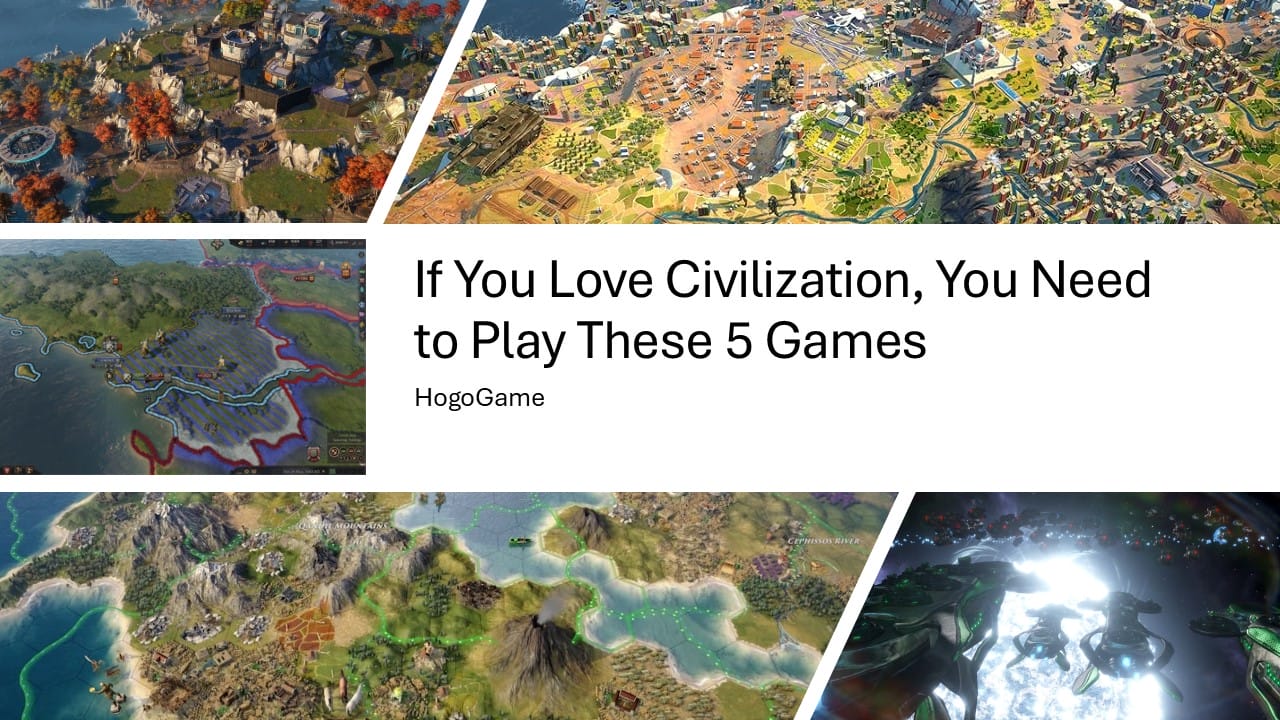You know the feeling. It’s that moment when you glance away from the screen, see the sun rising, and realize you’ve spent the entire night steering your empire through the ages. Your capital is a sprawling metropolis, your armies are poised on a rival’s border, and a new technology is just one turn away. That’s the magic of Civilization, a loop so compelling it has defined the strategy genre for decades. I love it, you love it, and we all have a story about that one game we’ll never forget.
But here’s something I’ve discovered over thousands of hours of map-painting: that incredible “one more turn” feeling isn’t exclusive to Civ. I’ve been on a long journey, a quest to find other games that could scratch that same strategic itch, and I’ve found some absolute gems. These are games that take the formula we adore and twist it, expand it, and launch it in directions I never thought possible.
So, I want to share them with you. Think of this as one strategy fan talking to another. If you truly love the deep, engrossing experience of building an empire in Civilization, then you owe it to yourself to try these five games. They aren’t just clones; they are masterpieces that will challenge you, captivate you, and likely steal hundreds of hours of your life. And you’ll love every minute of it.
Stellaris: Seriously, It’s Like Civ in Space, But So Much More
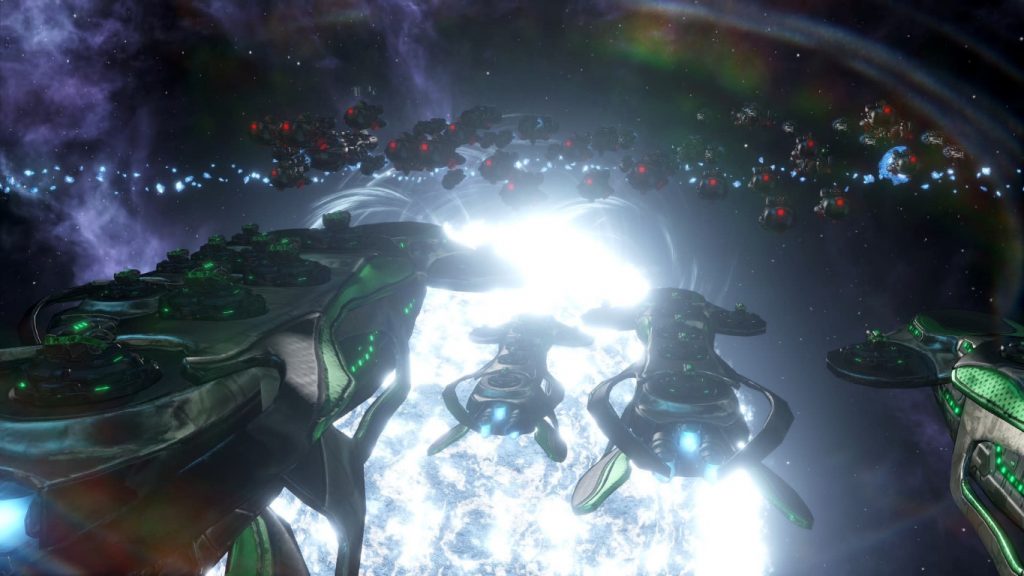
I always got to the end of a Civ game, launched my spaceship, and felt a twinge of sadness that the journey was over. Well, what if I told you there’s a game where launching that ship is just the beginning? That’s Stellaris. It’s the galactic empire fantasy you’ve dreamed of, and it’s become my go-to “epic scale” game.
The Core Vibe for a Civ Player
Right away, a lot will feel familiar. You start with one planet, send out science ships to explore (your scouts), find new habitable worlds to colonize (your settlers), and manage an economy of resources that feel a lot like gold, production, and amenities. That core loop of exploring the unknown, expanding your borders, and building up your planets is all there. I got the exact same thrill from discovering a perfect “Gaia” world as I do from finding a prime river-and-hill spot for a new city in Civ.
The Big Hurdle (and Why It’s Not a Big Deal)
Okay, let’s address it upfront: Stellaris is real-time, not turn-based. I know, I was a turn-based purist too. But trust me on this. The game has an adjustable speed and, most importantly, a pause button. This is your sacred tool. I basically play Stellaris like a turn-based game. I let it run for a bit, a notification pops up, and I hit the spacebar to pause everything. I can then take all the time I need to look at the situation, issue orders to my fleets and planets, and think through my grand strategy. It gives you the deliberate, thoughtful pace of Civ but with a more organic flow. You won’t miss the ‘Next Turn’ button, I promise.
Where It Blew My Mind: Your Own Sci-Fi Story
The real magic of Stellaris, and the reason I’ve sunk countless hours into it, is its ability to create stories. Civ gives you a sandbox; Stellaris gives you a story engine.
- Example 1: Truly Alien Empires: The first time I sat down at the empire creation screen, I was floored. You’re not just picking a pre-made faction. You’re building one from scratch. I once created a race of Fanatic Purifier snails who believed all other life was a blight to be cleansed from the galaxy. The game was a non-stop war of extermination. My next game, I played as the United Nations of Earth, trying to build a peaceful, xenophilic federation. These weren’t just different playstyles; they felt like entirely different games, with unique mechanics, events, and goals. The level of customization makes every new game a completely fresh start.
- Example 2: Goody Huts with a PhD: Remember finding “goody huts” in Civ? In Stellaris, your science ships find Anomalies. You might discover a planet frozen in time, a derelict ghost ship, or an ancient alien mural. These kick off fascinating, multi-stage story events with real choices and consequences. I once spent 50 years investigating a precursor signal that led me on a galaxy-spanning archaeological dig, uncovering the tragic story of a fallen empire and eventually unlocking access to their incredible technology.
- Example 3: Surviving the Apocalypse: Victory in Civ is about crossing a finish line. The most memorable part of Stellaris is the end-game Crisis. After a few hundred years, something terrible happens. Maybe extra-dimensional invaders pour through a portal to feed on the galaxy’s souls. Maybe a robotic “Contingency” awakens to sterilize all biological life. The game shifts from a competition to a desperate, all-hands-on-deck fight for survival. I’ll never forget the game where my bitter rival and I had to merge our fleets into one massive armada to hold the line against the swarm. It’s the most cinematic experience I’ve ever had in a strategy game.
My Advice for Jumping In
- Start with the United Nations of Earth. They’re the most straightforward, “vanilla” human faction and a great way to learn the basics without any weird rules.
- Get a handle on your core resources. Energy Credits are money, Minerals are for building stuff, and Alloys are for ships and starbases. The biggest rookie mistake I made was not building enough Alloy foundries, so my fleet was weak.
- Build at least two extra science ships right away and set them to auto-explore. Knowledge is power.
- Use that pause button! Pause every time a notification pops up. Read it, think, decide, then unpause. Treat it like the end of a turn.
Endless Legend: The Fantasy 4X I Wish I’d Played Sooner
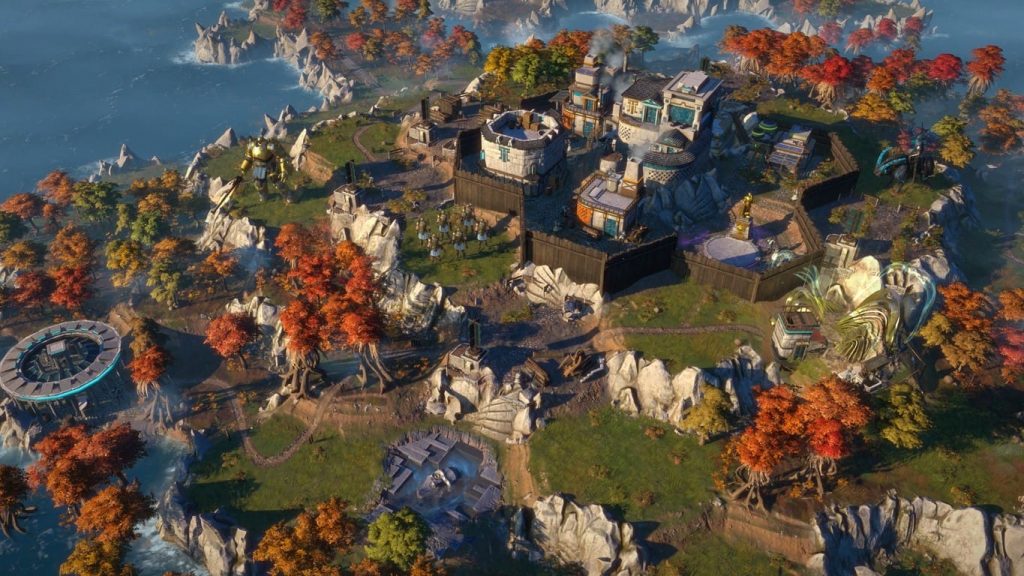
If you love the satisfying, grid-based strategy of modern Civ but secretly wish you could command giant land-whales and vampiric knights, then you need to stop what you’re doing and check out Endless Legend. It keeps the hexagonal, turn-based core we love but wraps it in a gorgeous, original fantasy world with some of the most creative faction designs I have ever seen.
The Core Vibe for a Civ Player
From the moment you start, Endless Legend feels comfortable. The hex grid, the city management (Food, Industry, Science, and Dust, which is gold), the tech tree—it all clicks into place instantly for a Civ player. I found myself settling cities and planning out my districts just like I would in Civ VI. The world itself, Auriga, is breathtakingly beautiful, and the changing seasons, especially the brutal onset of winter, add a fantastic strategic layer that makes the map feel alive.
The Game-Changer: Factions That Break the Rules
Here’s where Endless Legend completely won me over. In Civ, every nation basically plays the same game with different chrome. In Endless Legend, the factions are so wildly different they feel like they’re from separate games.
Moments You Won’t Forget
The sheer creativity on display here is astounding. Playing this game for the first time was a series of jaw-dropping moments as I discovered what each faction could do.
- Example 1: Wildly Unique Factions: I’m not just talking a unique unit and building. I mean game-changing mechanics.
- I played a game as the Roving Clans, a faction of nomadic traders. I literally could not declare war on anyone. Instead, my power came from controlling the global marketplace, where I could place embargoes and take a cut of every single transaction other players made. Oh, and my cities? They were built on giant beetles, and I could pack them up and walk them to a new location. Mind. Blown.
- Then I tried the Cultists. They can only ever have their one main capital city. That’s it. No settlers. Their path to victory is to use their fanatical influence to convert minor factions all over the map, raising a massive horde of proxy armies to overwhelm their enemies.
- The Allayi are a nature-loving faction that changes form with the seasons, becoming more powerful in the winter that cripples everyone else.
- Example 2: A Story That Guides You: Every faction has its own story quest line that feels like a single-player RPG campaign woven directly into the sandbox gameplay. These quests aren’t just for flavor; they give you a clear sense of direction and offer incredibly powerful rewards, all while teaching you about the deep, mysterious lore of the world.
- Example 3: Combat with Real Tactics: When your army attacks an enemy in Civ, numbers crunch and a health bar goes down. In Endless Legend, when armies meet, the game zooms in and you fight a tactical battle right there on the terrain of the map. You deploy your units, give them orders, and try to use elevation and positioning to your advantage. I’ll never forget my first time placing my archers on a cliff and watching them rain down death on enemy infantry who couldn’t reach them. It makes warfare so much more engaging and skill-based.
My Pro-Tip for Your First Game
- I’d suggest starting with the Wild Walkers. They’re the most traditional faction, focused on industry and building things, so they’re a great way to learn the game’s systems without any crazy rules.
- Follow your faction quest! Seriously, it’s your best guide. The rewards are amazing and it gives you a clear goal to work towards.
- Get ready for winter. The first winter will be mild, but they get worse. Your units move slower and your cities produce less food and dust. You need to plan for it.
- Don’t just kill minor factions. You can do quests for them or attack them to pacify their villages. Once you do, you can assimilate them into your empire and build their unique unit type. It’s key to having a strong army.
Crusader Kings 3: Okay, Hear Me Out on This One…
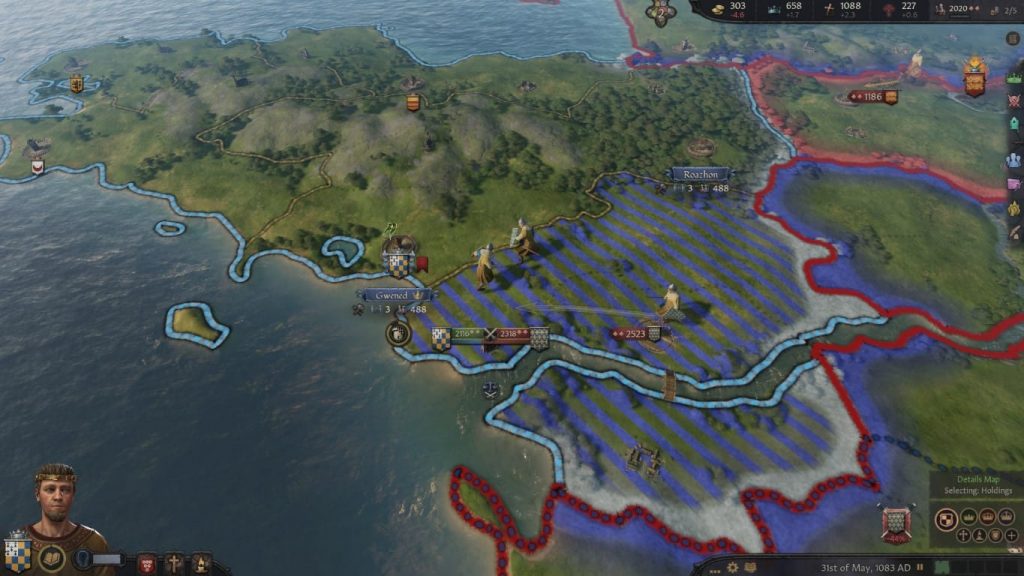
Alright, this next recommendation is a bit of a curveball, so stick with me. Crusader Kings 3 isn’t a 4X game. It’s what the community calls a “Grand Strategy RPG.” You aren’t playing as a country. You’re playing as a person—a king, a duke, a count—and when they die, you continue as their heir. If you’re like me and love the long-term, multi-generational planning in Civ, this game will hook you in a way you can’t imagine. It’s all the grand strategy with a deep, personal, and often hilarious dose of human drama.
The Core Vibe for a Civ Player
You’re still looking at a giant map, managing a realm, trying to make it bigger and better, and dealing with your neighbors. The scale feels right. But the fundamental perspective shift is everything. You’re not playing as England; you’re playing as King William, and your primary concerns are that your son is a rebellious idiot, your wife is cheating on you with your spymaster, and your most powerful vassal is plotting to kill you.
The Mind-Bending Shift: It’s All About Family
This is the core of CK3 and why it’s so brilliant. The game isn’t driven by abstract national stats; it’s driven by thousands of individual characters with their own personalities, skills, ambitions, and relationships.
Where the Real Drama Is
CK3 is less a game and more a story generator. I’ve had more memorable, unscripted moments of triumph, tragedy, and comedy in this game than any other.
- Example 1: The Succession Crisis Experience: My first game, I had built the perfect empire. My king was a genius diplomat and a legendary warrior. I was unstoppable. Then, he fell off a horse and died. I was suddenly playing as his 4-year-old son, a sickly child with a stutter. Instantly, my vassals—who all loved my old character—saw weakness. Factions rose up demanding independence. My uncles declared war to claim the throne for themselves. My entire game became a desperate scramble of bribery, marriage alliances, and assassinations just to hold the realm together until my new king came of age. It was the most stressful and thrilling experience.
- Example 2: Intrigue That’s Personal: Forget about just stealing technology. In CK3, I once discovered that my rival king had a dark secret. I used my spymaster to fabricate a “hook” on him, which I then used to force him into a matrilineal marriage with my daughter. This meant their children would be of my dynasty. His grandson, the heir to his throne, was now my grandson. It was a long, patient scheme that won me a kingdom without raising a single sword. You can seduce, murder, befriend, torture, and blackmail your way through medieval politics.
- Example 3: Winning by Giving Land Away: In Civ, giving away a city is almost always a bad move. In CK3, the ultimate goal is the glory of your dynasty, not just your personal realm. I once conquered a neighboring kingdom and granted it to my brother to rule as an independent king. My map territory got smaller, but my dynasty’s total “Renown” skyrocketed, unlocking powerful legacy perks for all my future characters. The goal isn’t just to paint the map your color, but to see your family name on thrones all across it.
Don’t Be Scared, Start Here
- The community has a famous starting spot for a reason: pick any ruler in Ireland in the 1066 start date. It’s called “Tutorial Island.” You’re isolated from the giant empires of Europe, and you have a single, clear goal: unite Ireland under your rule.
- Your first priority, always, is to get married and have an heir. If you die without an heir of your dynasty, it’s game over.
- The tooltips in this game are a lifesaver. You can hover your mouse over almost any word and it will explain it. Then you can hover over words in that explanation! It’s how I learned to play.
- Role-play! This is my biggest piece of advice. If the game says your new king is ‘Lazy’ and ‘Gluttonous,’ don’t try to be a great warrior. Host feasts and relax. If he’s ‘Wrathful’ and ‘Ambitious,’ start some wars and make rivals. The game is at its best when you embrace the character you’re given.
Humankind: The “Civ Killer” That Became Its Own Awesome Thing
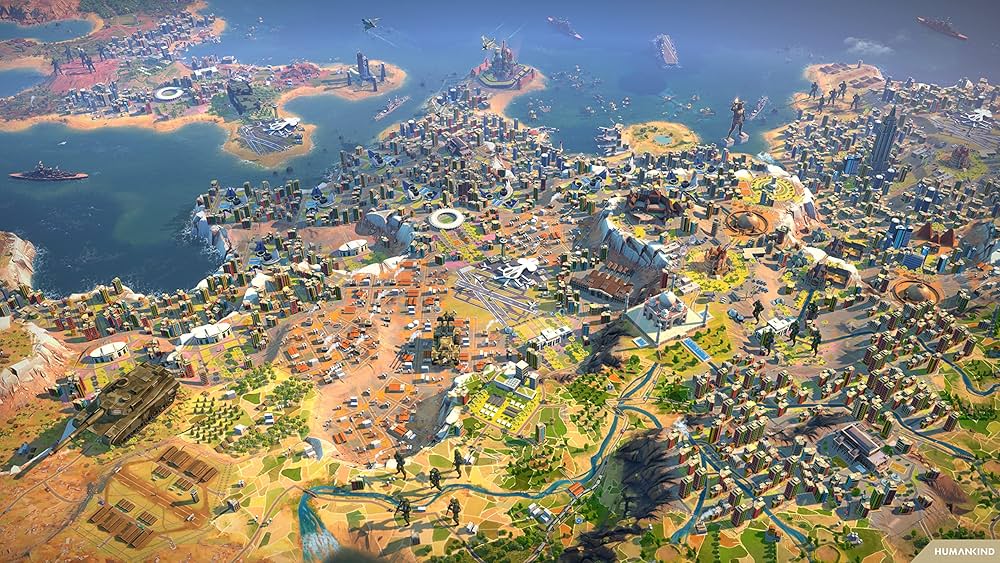
This is the game that everyone pointed to as the next big challenger to Civ’s throne. Made by the same people who did Endless Legend, Humankind takes the historical 4X setting we know and love and introduces a revolutionary twist: what if your civilization could change and adapt as it moved through history? It’s an incredible game that stands on its own and introduces some ideas I now wish Civ would adopt.
The Core Vibe for a Civ Player
If you’ve played Civ VI, Humankind will feel incredibly familiar. It’s a gorgeous, turn-based historical game on a hex grid. You build cities, expand them with districts that sprawl across the terrain, research tech, and build armies. I jumped in and immediately knew what to do. The core rhythm is pure 4X bliss.
The Core Twist I Love: Evolving Your Culture
Here’s the masterstroke. You don’t pick the Romans and play as them for 6000 years. Instead, as you progress through the six eras of history, you get to choose a new culture to adopt. And you keep the legacy trait from your previous cultures.
Why It Feels Different to Win
This cultural evolution, combined with a totally different victory system, makes you play in a way that feels fresh and exciting.
- Example 1: My Dream Team of Cultures: The strategic possibilities this opens up are just amazing. In one of my favorite games, I started as the Ancient Era Egyptians to rush out some early wonders. Then, in the Classical Era, I transitioned to the Maya to build up my cities’ industry and population. In the Medieval Era, I picked the English for their farming bonus to sustain my huge population. By the end, I had created a unique cultural hybrid perfectly suited to my strategy. It prevents that common Civ problem where your civilization’s bonus is great early on but useless later.
- Example 2: Fame, the Great Equalizer: Civ has all these separate victory paths. Humankind has one goal: Fame. You get Fame points for almost every significant thing you do—discovering a natural wonder, being the first to circumnavigate the globe, winning a big battle, building a wonder. The player with the most Fame at the end of the game wins. I love this system because it rewards you for playing a well-rounded game. You can’t just hide in a corner and rush science; you have to engage with exploration, military, culture, and expansion to stay competitive.
- Example 3: Cities That Shape the Land: The way you build cities is really cool. The map is divided into territories. You claim a territory with an outpost, which you can then attach to an existing city. Then, you build all your districts out from the city center, spreading across the landscape to grab the best resource yields. It creates these huge, organic-looking urban sprawls and makes fighting over a territory with good mountains or rivers feel incredibly important.
My Advice for Your First Playthrough
- Your main goal in each era is earning Era Stars. You get them for military, expansion, science, etc. The faster you earn them, the sooner you can advance to the next era and get first pick of the best cultures.
- Don’t get too attached to your current culture’s identity. Always be thinking about your next move. If you know you’re headed for a war, pick a culture with a strong military unit in the next era.
- Chase that Fame! If you have a chance to complete a competitive deed or build a wonder, go for it. Those Fame points are permanent and can’t be taken from you.
- Like Endless Legend, it has a tactical combat system. Take the time to learn it. Using high ground and flanking makes a huge difference.
Old World: The Game a Civ IV Legend Made For Us
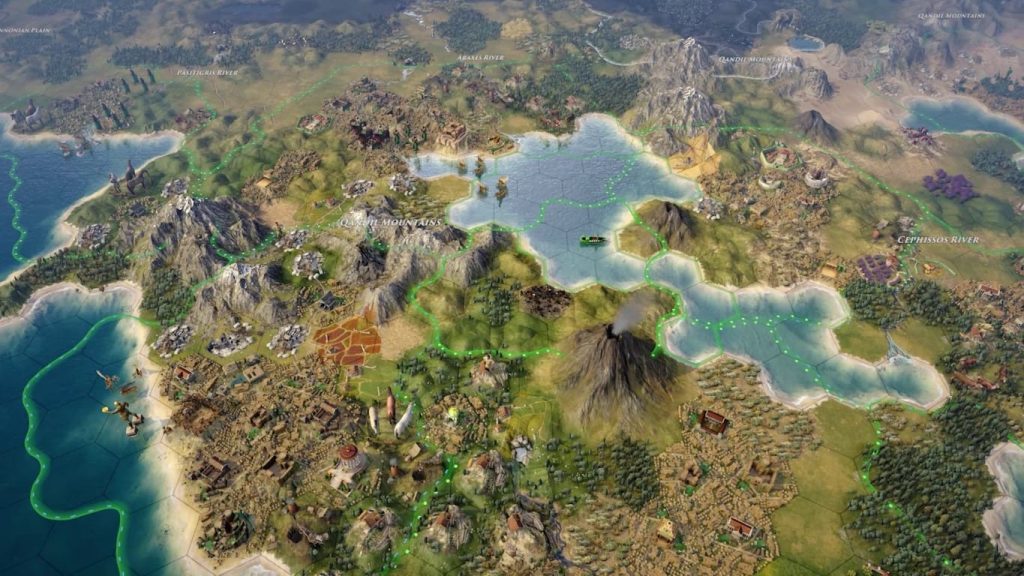
Last but certainly not least is a game that feels special to me. Old World is a historical 4X designed by Soren Johnson, who was the lead designer on Civilization IV—a game many of us consider one of the best of all time. You can feel that brilliant design philosophy here. It takes the best part of a Civ game (the early classical era) and perfects it, adding in character mechanics and one killer feature that solves the biggest problem in the genre.
The Core Vibe for a Civ Player
This game feels like coming home. It’s focused entirely on the classical era, so you’ll be playing as Rome, Greece, Persia, etc. The hex grid, city building, and tech tree are all there. It has that classic Civ feel, but with a modern polish and some truly genius new ideas.
The Two Mechanics That Changed Everything for Me
Old World introduces two concepts that are so good, I now find it hard to play other 4X games without them.
- The Orders System: In Civ, especially late in the game, you have to move every single one of your dozens of units every turn. It’s a slog. Old World fixes this with “Orders.” Each turn, you get a limited pool of Orders. Moving a scout costs an Order. Making a worker build a farm costs an Order. Attacking with an army costs an Order. You simply cannot do everything. It creates this amazing, constant strategic tension.
- Characters Matter: Like Crusader Kings, your leader and your court are real characters with stats and personalities. They will get married, have children, and eventually die. You have to manage your relationships with the great families of your nation and put the right people in the right jobs. It adds a wonderful layer of human drama to the strategic puzzle.
How It Plays Out
These systems combine to make every single turn a series of fascinating choices.
- Example 1: The Agony of Choice: I’ll never forget a turn where I had 12 Orders. My general told me he could finish off a rival army if I spent 4 Orders on his attack. My governor told me she could rush a wonder if I spent 6 Orders. And my scouts were on the verge of discovering new city locations. I couldn’t afford to do it all. What was more important? The short-term military victory or the long-term cultural one? Having to make that kind of trade-off every single turn is what makes Old World so brilliant.
- Example 2: My Idiot Son, the General: The event system is constantly throwing character-based choices at you. I once had a brave, brilliant general winning all my wars. Back at home, my son and heir came of age, and he was a lazy coward. An event fired where he demanded command of an army. I had to choose: anger him and my family by saying no, or give him an army where his cowardice would be a liability in battle. These are the kinds of choices you face.
- Example 3: A Race Against Time: The game only lasts 200 turns, and your leader is mortal. Your goal is to achieve 10 “Ambitions” to win. These are dynamic goals given to you throughout the game. It creates a real sense of urgency. You’re not just building an empire for the ages; you’re trying to build a legacy within your own lifetime.
Here’s How I’d Start
- I’d suggest playing as Rome. They’re a military powerhouse, and their goals are very clear and easy to follow as you learn the game.
- Treat Orders like your most valuable resource. In the early game, I spend almost all of mine on scouting to find the best spots for new cities. Never waste them!
- Pay attention to the events. Don’t just click through them. The choices you make have real, long-term effects on your leader, your family, and your empire.
- Specialize your cities. It’s much more important here than in Civ. Have one city focused on training military units, another focused on science, and another on generating money.
I’ll always have a place in my heart and on my hard drive for Civilization. It’s the king. But my gaming life has become so much richer since I branched out and explored these other worlds. Each one offers a unique flavor of the strategic depth we crave. So please, take a leap of faith. Pick the one that sounds most exciting to you and give it a try. Your next 500-hour obsession might be waiting just one click away.
